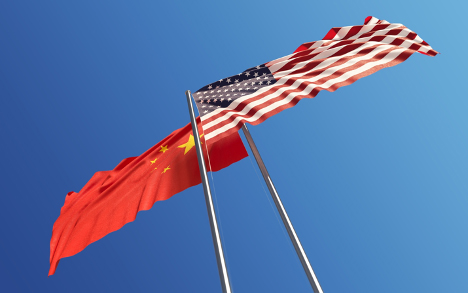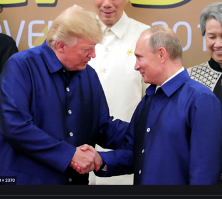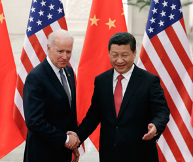Go Straight to The Bottom Line
Your local library probably has enough scholarly volumes on US relations with Russia and China to cover your kitchen floor knee-deep. Out of respect for your browsing time, however, we leave those volumes closed and train our lights on the headline issues of the day. For a deeper look at the candidates’ differences on Russia and China, we recommend the non-partisan coverage at Council on Foreign Relations, and we thank CFR for the re-use of their content further down this webpage.

America in 2020 remains locked in high stakes disputes with Russia and China. Though the Cold War is long over and globalized finance makes us increasingly interdependent, the US continuously wrestles with Russia and China for control of economic resources that are key to shoring up domestic productivity and creating jobs at home. Flash points in the competition include trade rules, expansionism, economic espionage, human rights, climate, and the arms race. Both candidates acknowledge the significance of managing these competitive relationships.

RUSSIA
In his first term, Trump took heat for appeasing Russia. He cooled off NATO ties, turned over control of Syria to Putin and Assad, and downplayed Putin’s interference in US domestic politics. With no support from other G7 members who had expelled Russia for its 2014 Crimea landgrab, Trump pushed unilaterally for Russia to be re-admitted to this elite club of economic powers. But Trump’s policies were mixed – under pressure from Congress, he also armed Ukraine with lethal missiles to help protect it from Russian expansion, imposed sanctions, and expelled 60 Russian diplomats.
Biden emphasizes that containing Russian aggression relies on close diplomatic teamwork between the US and Europe. He advocates strengthening the economic cohesion of the EC and beefing up the defense capacity of NATO to contain Russia, strongly criticizing Trump’s keep-his-distance stance on NATO. He identifies Russian cybercrime as a major threat to the US and has forcefully supported stronger cyber defense measures.
Here’s what the Council on Foreign Relations has to say:
In the wake of Western efforts to develop a cooperative post–Cold War relationship with Russia, the country has reemerged as a top U.S. rival and an object of mistrust and suspicion. To its critics in Washington, including many of the 2020 Democratic contenders, Moscow’s foreign policy has become dangerously aggressive in recent years, from military intervention in Ukraine and Syria to interference in Western elections to violation of nuclear treaties. Read more
Donald J. Trump (R – Incumbent)
Trump has cultivated cordial relations with Russian President Vladimir Putin and dismissed accusations that his campaign cooperated with Moscow’s interference in the 2016 U.S. election. He has argued for closer cooperation with Russia while also bending to congressional pressure to extend sanctions on Moscow, expanding military aid to Ukraine, and withdrawing from a major U.S.-Russia arms control treaty.
Biden warns that Russia under President Vladimir Putin is “assaulting the foundations of Western democracy” by seeking to weaken NATO, divide the European Union, and undermine the U.S. electoral system. He also warns of Russia using Western financial institutions to launder billions of dollars, money he says is then used to influence politicians.
CHINA
The candidates agree that China’s bold takeover moves in Hong Kong and the South China Sea, along with its chronic pillaging of US technology, represent a stark threat to US interests. Where Trump pulled out of the 12-nation Trans Pacific Partnership and opted to go it alone with a unilateral tariff battle, Biden argues for a US leadership role in building multilateral trade groups that can stand together against Chinese opportunism. Both recognize China’s increasing influence over Pacific, South Asian, and African nations and its fast-growing power to redefine world markets, overturning seven decades of US dominance. Effective diplomacy between the US and China must include positive incentives, deal-making, recognition of domestic realities, and willingness to impose trade penalties. The record of blame and non-cooperation between China and the US on Covid-19 showcased fairly widespread diplomatic failure and antagonism, suggesting the next president will face challenges on establishing a more fruitful partnership.
It’s worth checking this summary from Council on Foreign Relations.
China – Council on Foreign Relations
The increasingly confrontational U.S.-China relationship has aroused international concern and become a central issue in the 2020 race, heightened by the pandemic of the new coronavirus disease, COVID-19, that originated there. Washington has long sought to manage China’s rise by integrating the country—now one of the world’s two largest economies—into global institutions such as the World Trade Organization (WTO) in the hope that China would fully accept the prevailing international order. But U.S. policymakers have struggled to respond to Beijing’s growing assertiveness. Read more
Donald J. Trump (R – Incumbent)
Trump has sought to confront China over what he says is a suite of economic abuses: intellectual property theft, currency manipulation, export subsidies, and economic espionage. He says aggressive action is required to protect American workers and to reduce the United States’ large bilateral trade deficit, and that the coronavirus crisis demonstrates the need to hold China accountable.

Biden has framed China’s rise as a serious challenge. He has criticized its “abusive” trade practices–warning that it may pull ahead of the United States in new technologies–and its human rights record. He says he would mount a more effective pushback against China than Trump and work more closely with allies to pressure Beijing.
The Bottom Line This one is hard to call. Trump has been opportunistic with China – supportive at times, combative at others – and it’s hard to argue that that might not be the right approach. Biden presumably would seek to develop more normalized, on-going relations with China, while standing tough in the areas where China seems to be over-exerting its power and influence. Which approach works better? The bottom line here might be less about US-China relations and more about US relations with the rest of the world. A restoration of American influence and strong relationships with other world powers would send a signal to China’s leaders and, perhaps, dampen their efforts to expand their country’s own global influence. Which candidate would be more likely to restore those relationships? You decide.